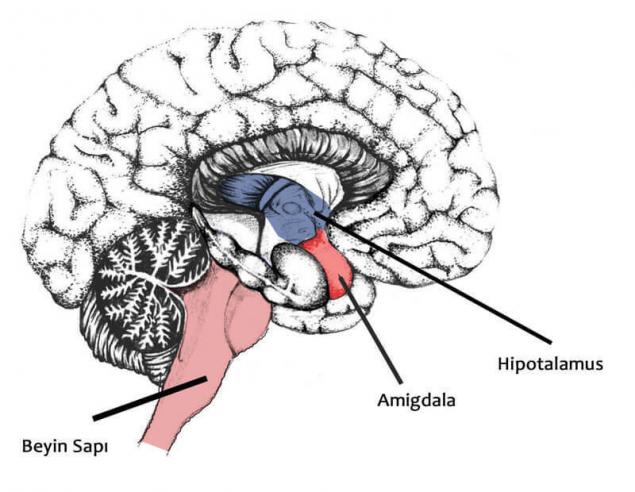Breaking the deadlock: What to do when nothing desirable, and nothing pleases
 Bashny.Net
Bashny.Net
Changes cause stress is absolutely normal.
When an animal sees something new, it stiffens and initially refers to it very disturbing. Increased secretion of adrenaline, the whole body is mobilized, muscles are ready for active movements, the attention is focused.
In popular literature the stress associated with negative phenomenon, but in fact it is not. Under stress, a person not only feels a surge of physical strength — improve and brain function.

Scientists have found that a person remembers better in a stressful situation, as in the process of analysis and information processing, the brain starts to use not only hippocampus, but amigdalu, that is included in the reserves.
But nature did not put survival mechanisms during prolonged stress. It is impossible to keep the body for a long time in a state of high mobilization. From the point of view of evolution if the animal is not able to cope, to escape, to defeat or get away from it, then most likely it is already dead or eaten by other animals.
On the one hand, the world becomes dynamic and rapid, and with another — a stressful situation can be extremely protracted. Even some minor conflict at work can take several months or even years, but what about the more serious problems, such as divorce.
Prolonged such dysfunctional stress is called distress. The fact that grieving takes our cognitive resources, and it is a vicious circle: the more we suffer, the fewer the resources to find solutions to the problem, since the brain is completely filled with negative emotions, which only worsens the situation and increases the experience.
Spiral twisted for some time, and eventually we found ourselves in a position where nothing desirable, nothing pleases and does not cause still fun. We can't even imagine my future with any optimism — and this is one of the major signs of depression. There is a vicious circle from which it is very difficult to get out, as the evolution is laid, we need automatic tools.
Those who have already fallen into a state of depression, are not likely to read this blog, as nothing interesting and does not attract the attention of the individual — his brain is busy only experience. The ability to experience, to think about the future and to imagine is a distinctive human trait, and is responsible for that one section of the brain. Homo sapiens from Neandertals apes just sets, among other things, this is a significant development of the frontal cortex of the brain.

One of the surgical methods of treatment resistant clinical depression was, ironically, a lobotomy. Patients literally hatchet ice cut fabric orbitofrontal cortex. The result of this operation, the person calmed down... couldn't imagine. The doctors asked questions to the patients past the operation that a person experiences when thinking about their future, the answer most often was — nothing, just emptiness.
Daniel Gilbert in his book "Stumbling on happiness" gives three basic lack of imagination:
1. Our imagination allows himself to arbitrarily fill in the necessary information and very often misses the most important thing. Our brain is able to anticipate and predict the next event. When we listen to someone's voice, do not hear all sounds, and our brain easily fills in the gaps. We sometimes do not even perceive that something didn't catch. When we read some text, you can easily guess what the proposal will be the next avocado. Ops, stumbled, because the brain is anticipating that there will be "word" and not "avocado". But in the case of long-term forecasts and attempts of the imagination, our brain starts to randomly fill in the blanks.
2. We usually present projected into the future. Re-read science fiction 1980-1990-ies, who imagined the world today, and there you will see a slightly transformed past in which lived the authors. The future is unknown and developments depends on a huge number of random events. Accordingly, if we perceive the current situation as negative, then it is too difficult to imagine a happy future.
3. We are always wrong when trying to guess what our feelings and emotions when and if there will be certain events. We think that we are in a state of euphoria, when the victory of our favorite team or we will get a raise. In fact, when these events occur, they will be against many other various events, a different emotional background and, most likely, will be apprehended by us in a completely different way, at least not as bright as we assume in our imagination. Yes, and it is almost impossible to imagine the good feelings in the future in a time when we suffer in the present.
Thus, if you are in a situation from which you are unable to find a way out, when you perceive their present as horrible and hopeless future, it is better not to get caught in a vicious circle of emotions and not to make these errors:

Instead, it is better to follow the following simple rules:
Also interesting: good-bye, the crisis!
Oktava life or about the crisis
The main task is solving the problem, to stop running like a hamster in a wheel. The longer is the way out of the situation, the uniform and become anxious thoughts that lead to more experiences and contraction of the considered solutions to the problem. It turns out that instead of riding, we are sitting in a running car, press gas, gasoline burns, the smoke goes and the car does not move — a bit like speed to include something we have forgotten, because the brain is busy with suffering, and the eyes look continuously at one point.published
Author: Arye Gottsdanker
P. S. And remember, just changing your mind — together we change the world! ©
Source: orgdev.ru/%D0%BA%D0%B0%D0%BA-%D0%BD%D0%B5-%D0%B2%D0%BF%D0%B0%D1%81%D1%82%D1%8C-%D0%B2-%D0%B4%D0%B5%D0%BF%D1%80%D0%B5%D1%81%D1%81%D0%B8%D1%8E-%D0%B2-%D0%BF%D0%B5%D1%80%D0%B8%D0%BE%D0%B4-%D0%BA%D1%80%D0%B8%D0%B7%D0%B8%D1%81%D0%B0-5f90c4b2b3c2#.xpzyi
When an animal sees something new, it stiffens and initially refers to it very disturbing. Increased secretion of adrenaline, the whole body is mobilized, muscles are ready for active movements, the attention is focused.
In popular literature the stress associated with negative phenomenon, but in fact it is not. Under stress, a person not only feels a surge of physical strength — improve and brain function.

Scientists have found that a person remembers better in a stressful situation, as in the process of analysis and information processing, the brain starts to use not only hippocampus, but amigdalu, that is included in the reserves.
But nature did not put survival mechanisms during prolonged stress. It is impossible to keep the body for a long time in a state of high mobilization. From the point of view of evolution if the animal is not able to cope, to escape, to defeat or get away from it, then most likely it is already dead or eaten by other animals.
On the one hand, the world becomes dynamic and rapid, and with another — a stressful situation can be extremely protracted. Even some minor conflict at work can take several months or even years, but what about the more serious problems, such as divorce.
Prolonged such dysfunctional stress is called distress. The fact that grieving takes our cognitive resources, and it is a vicious circle: the more we suffer, the fewer the resources to find solutions to the problem, since the brain is completely filled with negative emotions, which only worsens the situation and increases the experience.
Spiral twisted for some time, and eventually we found ourselves in a position where nothing desirable, nothing pleases and does not cause still fun. We can't even imagine my future with any optimism — and this is one of the major signs of depression. There is a vicious circle from which it is very difficult to get out, as the evolution is laid, we need automatic tools.
Those who have already fallen into a state of depression, are not likely to read this blog, as nothing interesting and does not attract the attention of the individual — his brain is busy only experience. The ability to experience, to think about the future and to imagine is a distinctive human trait, and is responsible for that one section of the brain. Homo sapiens from Neandertals apes just sets, among other things, this is a significant development of the frontal cortex of the brain.

One of the surgical methods of treatment resistant clinical depression was, ironically, a lobotomy. Patients literally hatchet ice cut fabric orbitofrontal cortex. The result of this operation, the person calmed down... couldn't imagine. The doctors asked questions to the patients past the operation that a person experiences when thinking about their future, the answer most often was — nothing, just emptiness.
Daniel Gilbert in his book "Stumbling on happiness" gives three basic lack of imagination:
1. Our imagination allows himself to arbitrarily fill in the necessary information and very often misses the most important thing. Our brain is able to anticipate and predict the next event. When we listen to someone's voice, do not hear all sounds, and our brain easily fills in the gaps. We sometimes do not even perceive that something didn't catch. When we read some text, you can easily guess what the proposal will be the next avocado. Ops, stumbled, because the brain is anticipating that there will be "word" and not "avocado". But in the case of long-term forecasts and attempts of the imagination, our brain starts to randomly fill in the blanks.
2. We usually present projected into the future. Re-read science fiction 1980-1990-ies, who imagined the world today, and there you will see a slightly transformed past in which lived the authors. The future is unknown and developments depends on a huge number of random events. Accordingly, if we perceive the current situation as negative, then it is too difficult to imagine a happy future.
3. We are always wrong when trying to guess what our feelings and emotions when and if there will be certain events. We think that we are in a state of euphoria, when the victory of our favorite team or we will get a raise. In fact, when these events occur, they will be against many other various events, a different emotional background and, most likely, will be apprehended by us in a completely different way, at least not as bright as we assume in our imagination. Yes, and it is almost impossible to imagine the good feelings in the future in a time when we suffer in the present.
Thus, if you are in a situation from which you are unable to find a way out, when you perceive their present as horrible and hopeless future, it is better not to get caught in a vicious circle of emotions and not to make these errors:
- Do not try to control your future, it is unknown, there are some factors, but too many coincidences comes into play. We learned to imagine, but not yet able to predict.
- Do not need to consider their past, especially from the point of view of what we liked and what not. Our brain quickly erases from memory the sensations and replaces them based on the current situation.
- No need to try to imagine how you will feel in a particular situation in the future. If we can't remember his old sensations, future sensations worse can predict.

Instead, it is better to follow the following simple rules:
- Want to understand how you will feel in the future — look to others who experienced something similar. If you fear that you will have to work not by profession with a strong decrease in status and wages — way and talk with those of the Directors got into the drivers. If you fear that you will be disabled, then talk to a real invalid, and you will see that most of them were able to adapt to life. You'd be surprised how much sense a real person who has suffered a catastrophic situation will be different from your ideas about it.
- Look at the wider world. Any driver knows that if you look under the wheel, the speed seems more and it is easy to miss an important turn or bumps in the road. Looking into the future, you need to look with the widest possible horizon, dry statistics will give a better forecast than our subjective feelings.
- Focus on what people are evolutionarily adapted to survival in the here and now. We've got a pretty good feel threats and patterns that lead to success in the here and now. Without these skills our ancestors would not have been able to survive, having no fangs or claws or a good sense of smell. In the period of crisis and risk strategy, planning, analysis won't help much. What animals do when faced with danger is to run. Quick response and focus on immediate actions here and now are more likely to help cope with the threat than a deep emotional analysis of the situation.
Also interesting: good-bye, the crisis!
Oktava life or about the crisis
The main task is solving the problem, to stop running like a hamster in a wheel. The longer is the way out of the situation, the uniform and become anxious thoughts that lead to more experiences and contraction of the considered solutions to the problem. It turns out that instead of riding, we are sitting in a running car, press gas, gasoline burns, the smoke goes and the car does not move — a bit like speed to include something we have forgotten, because the brain is busy with suffering, and the eyes look continuously at one point.published
Author: Arye Gottsdanker
P. S. And remember, just changing your mind — together we change the world! ©
Source: orgdev.ru/%D0%BA%D0%B0%D0%BA-%D0%BD%D0%B5-%D0%B2%D0%BF%D0%B0%D1%81%D1%82%D1%8C-%D0%B2-%D0%B4%D0%B5%D0%BF%D1%80%D0%B5%D1%81%D1%81%D0%B8%D1%8E-%D0%B2-%D0%BF%D0%B5%D1%80%D0%B8%D0%BE%D0%B4-%D0%BA%D1%80%D0%B8%D0%B7%D0%B8%D1%81%D0%B0-5f90c4b2b3c2#.xpzyi
Tags
See also
Leo Babauta: WHAT to DO When the irritation begins to command
Julia simultaneously: the Child requires gadgets like classmates – what to do?
What if you were one on one with a heart attack? It is necessary to know everything!
What to do when "all annoying"
What to do if frozen windshield washer
What? Where? When?
Why the main issue is the question of "What to do?"
















